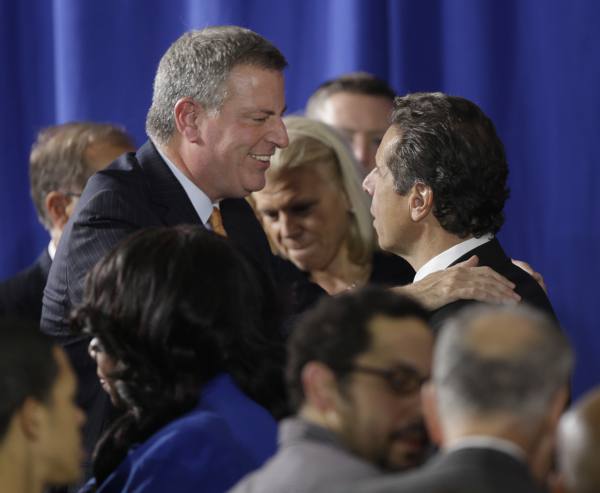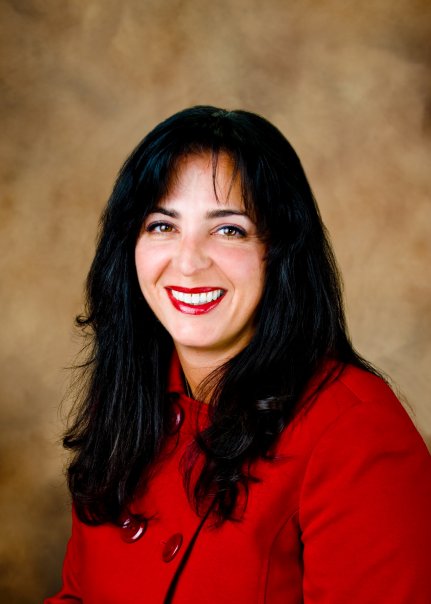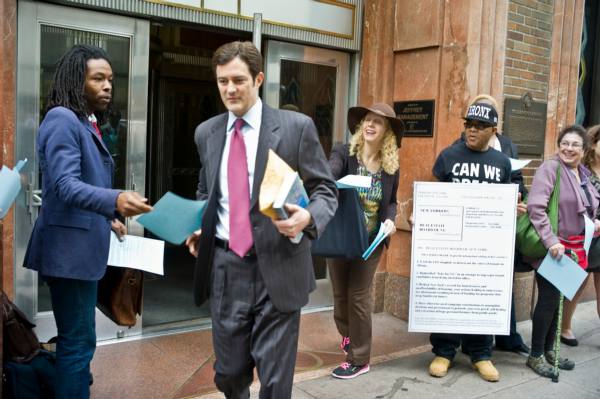
The mayor and the mayor-elect meet at City Hall, Nov. 6, 2013. (Photo: Flickr/Mayor's Office)
With a resounding victory at the polls, Mayor-elect Bill de Blasio has declared a mandate to counter the last 12 years under Michael Bloomberg with a “progressive” agenda. Now the Democrat has to match his rhetoric with the more prosaic labor of governance.
How will de Blasio tackle the major policy challenges the city will face after Jan. 1? Which will he give priority to, given limited resources and attention? Among the hundreds of smaller policy decisions to be made, there are some doozies: An expected $2 billion budget deficit. A municipal labor force pushing for $8 billion in retroactive pay. Some 1.7 million New Yorkers living below the poverty line.
Here’s a look at seven areas where he is expected to make significant changes that will transform the city — from how it houses its families, educates its children, polices its streets and plans for the monster storms of the future.
STAFFING
One of the biggest and most immediate ways that de Blasio can have an impact is through key appointments in his administration.
Reporters have been working overtime to predict who the de Blasio administration will select for two key positions — police commissioner and schools chancellor. The mayor-elect has signaled he is looking to replace both Police Commissioner Ray Kelly and Chancellor Dennis Walcott with people more amenable to the positions he staked out during his campaign.
Police Commissioner Raymond Kelly has become synonymous with New York law enforcement, policing in a post 9/11 world and an aggressive stop-and-frisk policy. There is little doubt de Blasio will be looking to put distance between his police department and Kelly — the question is just how much distance.
The mayor-elect has mentioned two names in particular. The first is former Police Chief Bill Bratton, who advised de Blasio throughout his campaign and served during the start of former Mayor Rudy Giuliani’s tenure and has expressed interest in returning to run the city’s police force. The second choice is the highest ranking officer under Kelly — Chief of Department Phillip Banks. Banks previously served as the chair of the Community Affairs Bureau.
Capital New York surveyed education policy experts and combined that research with comments de Blasio has made about what kind of qualifications a schools chancellor should have to get a sense of who he might be looking at to fill the positions. The likeliest pick, according to Capital, is a former or current member of the city’s Department of Education who has been critical of the Bloomberg’s policies.
De Blasio himself has made a number of revealing statements. He has said the DOE needs “an educator in leadership.” He has also been opposed to charter schools and advocated for increased parent participation. He has also repeatedly indicated that he will not select a candidate who needs a waiver because they lack an advanced degree in education — so expect de Blasio’s pick to be in stark contrast to Joel Klein or Cathleen Black.
Ultimately, whomever he chooses will set the tone for de Blasio’s reorienting of policy surrounding charter schools, co-locations and pre-K education.
POLICE REFORM
Ending the Bloomberg era of stop-and-frisk was a cornerstone of the de Blasio campaign. His nuanced position on the policing policy fueled the controversial primary ad that led Democratic rivals to call de Blasio a liar for identifying him as “the only candidate to end a stop-and-frisk era that targets minorities.”
De Blasio’s positions on public safety attracted little support from the police community during the campaign. During the primary, Detectives Endowment Association President Michael Palladino praised de Blasio rival Bill Thompson for being reasonable and realistic. Asked if the same could be said of de Blasio at Thompson’s concession speech in September, Palladino said: “No.”
Yet if exit polling from election night is any indication, New Yorkers explicitly want at least some sort of the reform that de Blasio promised: 55 percent of respondents found the current stop-and-frisk policy to be excessive, compared to 33 who don’t.
De Blasio’s take on public safety revolves around around the idea of community policing, which was a favorite paradigm of former police chief Bratton. In many ways, it’s contrary to the policing era under Kelly, who is often praised for his work on community engagement but is criticized for relying too heavily on the CompStat crime data-tracking system.
“We must work to promote a real partnership between the best police force in the world and the communities they protect from danger – be it local or global,” de Blasio said during his acceptance speech on Tuesday night. “New Yorkers on both sides of the badge understand this. We’re all hungry for an approach that acknowledges we are stronger and safer as a city when police and residents work hand-in-hand.”
On a practical level, de Blasio’s position on the policy has been the same one that almost all of his primary rivals held: stop-and-frisk is a useful tool that, in recent years, has been relied on too much and unconstitutionally targets young men of color. Like the rest of the Democratic slate, de Blasio supported Judge Shira Scheindlin’s court ruling that created an independent monitor to oversee NYPD’s application of stop-and-frisk going forward.
Last week, a federal appellate court put a hold on Scheindlin’s reforms and took her off the case. The news was a major victory for the Bloomberg administration, albeit a brief one. The city’s case against the Scheindlin ruling won’t be in front of a judge again until March 2014, and de Blasio has long vowed to drop the appeal.
He’s also vowed to drop the Bloomberg administration's appeal on a second stop-and-frisk case, specifically one of the laws from the belabored Community Safety Act passed earlier this year. One of the two bills expanded New York’s ban on profiling while also providing legal — but no monetary — remedies to aggrieved residents.
The Bloomberg administration joined police unions in admonishing the law and its supporters, arguing that it opens the door for needless lawsuits against officers and create chaos within the court system. However, de Blasio — the only mayoral candidate to support the Community Safety Act — has also promised to drop the appeal and move forward with the act’s partner bill to create an inspector general for the NYPD.
AFFORDABLE HOUSING
De Blasio says he wants to mandate developers to set aside a certain percentage of space in their buildings as permanent affordable housing in exchange for increased building heights and tax breaks. “It’s a step in the right direction,” said Jaron Benjamin of the Metropolitan Council on Housing.
But an optional version of the policy, instituted by Mayor Michael Bloomberg’s administration, has largely failed. Instead of stimulating the creation of more affordable housing, many developers have chosen to opt out of the program.
The issue of mandatory inclusionary zoning is just one of several policy priorities for tenant advocates. Another is reforming the laws in 2015.
De Blasio has promised to travel to Albany to fight for changes, even going so far as to say he would work to repeal the Urstadt Law that allows Albany to set affordable housing standards for the city. The Real Estate Board of New York did not spend against de Blasio despite his tough talk against the industry in the primary.
"He's not somebody that there's any reason for us to be frightened of. We've worked with him. We have no reason to believe he won't work with us,” REBNY president Steven Spinola told Capital New York last month. The comments give tenant advocates some pause.
“We are going to be looking at what he does in his first few months in office,” said Benjamin. “We will see what he does with the tax rebates that see the city losing money, whether he rolls over on mandatory zoning, does he make developers commit to truly affordable housing?”
ELECTIONS REFORM
One of the big issues for elections reform — instant runoff voting — may be decided before de Blasio gets into office. The City Council is holding a committee hearing Nov. 21 on two bills aimed at instituting IRV, which could go to Bloomberg before he leaves office (a good thing for supporters of IRV, too, since de Blasio has been cool to the policy). But there are plenty of other major elections reforms that could be implemented under the next mayor — not least of which is non-citizen voting.
Supporters of non-citizen voting say it would give a basic right to documented and tax-paying immigrants who have little say in the city’s operations. A 2010 bill to enact non-citizen voting was re-introduced this year by Queens Councilman Daniel Dromm, and the idea has gained traction among his peers.
So far, de Blasio has been tepid on the idea. "I've talked to the advocates on that issue," he said. "They've presented their plan to me. I'm not comfortable with it at this point. It's, I think, an idea that is founded in good intent but there's a number of specifics that I can't agree with, as least as it's written now."
Alex Camarda, who works on elections reform as at Gotham Gazette sister organization the director Citizens Union, said the good government group has no position on non-citizen voting.
But he said he thinks the mayor-elect would do well to push for to what might seem like a small change that would have major consequences for voter participation: requiring any modifications to records made at city agencies be reported electronically back to the Board of Elections so that voter records can be updated with correct information.
Camarda cites the example of the state Department of Motor Vehicle, which now reports new registrations and registration changes electronically to the state. He said the same could be done on the city level with all agencies. For example, he said, someone renewing their personal information to receive benefits through the Human Resources Administration would automatically have that information updated on voter rolls.
“It’s something within the power of the mayor to do,” he said. “That would greatly facilitate participation by voters who traditionally don’t.”
More importantly, he said the mayor-elect needs to use the broad powers of the office.
“The city has much more authority in election law that it has been led to believe,” he said. “The next mayor needs to more robustly use that authority instead of blaming the state for inaction and not pushing legislation forward.”
RESILIENCY
Public policies surrounding resiliency to extreme weather were once considered somewhat esoteric and secondary to bread-and-butter issues like education and public safety. After Superstorm Sandy, and the pummeling the city took, this has moved to the forefront of the debate over the future of the metropolis.
During his campaign, De Blasio outlined a framework for sustainability and made it clear he would continue some of the landmark resiliency plans put forward by the Bloomberg administration in a post-storm June report.
To Dan Hendrick of the New York League of Conservation Voters, de Blasio’s commitment to the Bloomberg plans are solid. “The question becomes how much of a priority this becomes,” said Hendrick, whose organization endorsed de Blasio. “How high is this going to rank? We think pretty high … A mayor can realistically focus on a handful of things.”
Beyond prioritization, the problem comes down to money, making creative staff decision and getting commitment on resiliency from city agencies, he said.
Russell Unger, the executive director of the Urban Green Council, said regulatory changes needed to revamp building codes to ensure buildings are more resilient to extreme weather is underway but much works remains to be done.
His organization, comprised of both public and private entities, released a “roadmap” for the next mayor in May along with a coalition of labor and real estate interests that support “green building.”
Among the many recommendations, the roadmap called for the appointment of a deputy mayor for infrastructure and sustainability to coordinate resiliency planning, update school construction specs and create training operations for workers to learn sustainable building operations.
But he said the biggest challenge may be keeping policymakers’ focus on resiliency policy, saying that many of the projects that would have the biggest effect on the fabric of the metropolis would not be completed for a generation. “How do we keep people’s attention on that? How do we keep the resources in place to make that happen?” he said.
OPEN DATA
Believe it or not, there is a “tale of two cities” when it comes to open data — the concept that municipal information from statistics to reports should be published in digital format that can be read by any machine and by the public.
John Kaehny of Reinvent Albany, a group that advocates for open data, says that while Bloomberg obsessed over data, performance metrics and key performance indicators, the mayor’s administration didn’t make the good stuff public.
“This privileged data universe has to end,” said Kaehny. Kaehny noted that the City Council has pressed the Bloomberg administration and city agencies like the New York City Housing Authority on basic performance data — for instance, data on broken doors at NYCHA properties and how quickly they get repaired — but haven’t been given access to it.
Kaehny said data like the New York Police Department’s crime mapping data could be used by the public and organizations all over the city. “This is not a roadmap for the bad guys to take Gotham City,” he said, adding that other cities across the nation make the same information available.
Kaehny said he has reason to believe that Mayor-elect Bill de Blasio will end the “parallel data universes.” He pointed to a study de Blasio did as public advocate about improving the city’s Freedom of Information Request response. Kaehny said he thinks de Blasio will implement the recommendations he made as public advocate and start to integrate all of the data requests the city gets into its open data portal.
“The open data portal is a bucket at the end of a big funnel of requests for information. It should be connected to FOIL requests, requests from 311 and other channels,” said Kaehny. “The current administration is always saying: ‘We don’t know what kind of data the public wants.’ But we do, they are asking for information all the time.”
While de Blasio does not share a background in business management like Bloomberg, Kaehny said the mayor-elect will likely capitalize on all the data gathering and performance measurement tools the Bloomberg administration implemented internally and make that data available to the public.
“De Blasio didn’t run a giant company that was focused on business analysis like Bloomberg,” said Kaehny. “But I do expect him to expand on what Bloomberg started because this is where big organizations are going. This is going to be so advantageous to the executive — to know where the problems are and how they are getting fixed.”
MUNICIPAL IDs
Two days before the election, Bill de Blasio called for New York State to catch up to Colorado as a progressive leader and approve drivers licenses for undocumented immigrants. Former Gov. Eliot Spitzer pushed a similar plan only to see major public backlash and to have it die in the state Legislature.
But this year, legislators are looking for de Blasio to lead on the issue. State Sen. Jose Peralta has introduced a bill that would allow the state Department of Motor Vehicles to issue licenses to immigrants who can provide non-U.S.-issued identification, prove residence in the state and that they have not been convicted of a felony.
Such a card would allow immigrants to open bank accounts, lease apartments or use certain city services but it would not allow them to vote.
“Sure, this fell apart under Spitzer six years ago,” said Peralta, “but since then 11 states have taken it up.” He said he expects de Blasio to work on perfecting the bill with the state Legislature. During the rally on Sunday, de Blasio touted his support for a municipal I.D. card for the undocumented.
“They may not be documented, but they are a half-million of our brothers and sisters, of our neighbors, of our family and friends," de Blasio told the crowd.











